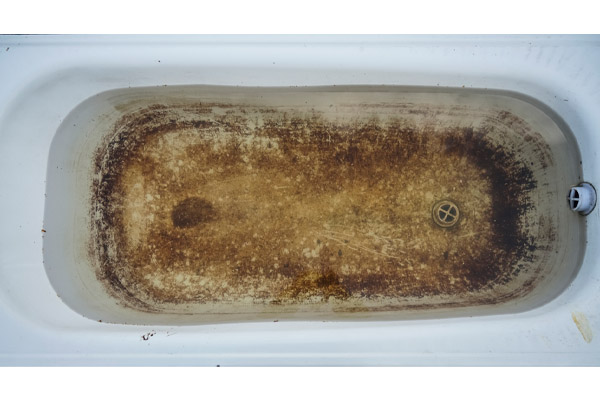An Definitive Explanation: Discharge Coming Up Through the Bathtub
An Definitive Explanation: Discharge Coming Up Through the Bathtub
Blog Article
Nearly everybody seems to have their personal thinking when it comes to What to Do if Sewage Starts Coming Up Through Your Bathtub.

Sewage back-up in the bathtub can be an upsetting and unhygienic issue for any kind of homeowner. Not just is it troublesome, yet it likewise postures major health and wellness threats and indicates underlying issues with the plumbing system. Comprehending why sewage is showing up via the bath tub is critical for taking ideal action to deal with the problem efficiently.
Introduction to the Problem
Recognizing the Problem
When sewer starts backing up right into the bathtub, it's a clear sign of an issue with the drain system. The wastewater that must be streaming far from your home is instead finding its way back right into your living space, which can result in significant damages and carcinogen.
Potential Reasons
Numerous elements can add to sewage backup in the bathtub. From clogs in the sewage system line to issues with the plumbing framework, determining the origin is necessary for locating a solution.
Usual Reasons for Sewage Back-up
Blockages in the Sewage System Line
Among the most typical reasons for sewer back-up is an obstruction in the sewer line. This can occur due to the build-up of particles, oil, or international objects in the pipelines, avoiding appropriate circulation and creating sewer to support right into your bathtub.
Tree Root Breach
Tree origins seeking moisture and nutrients can infiltrate sewer lines through little splits or joints. With time, these roots can grow and expand, causing substantial damage to the pipes and leading to sewer backup issues.
Aging Facilities
Older homes might have obsoleted plumbing systems that are extra vulnerable to rust, splits, and damage. As pipes age, they become a lot more prone to leakages and clogs, increasing the likelihood of sewer backup cases.
Heavy Rainfall or Flooding
Throughout durations of heavy rainfall or flooding, the sewer system might come to be overloaded with excess water, causing backups and overflows. This can cause sewer backing up into bath tubs and various other components inside the home.
Health Risks Related To Sewage Backup
Contamination of Water Supply
Sewage back-up can contaminate the water in your home, positioning a significant wellness threat to you and your household. Direct exposure to polluted water can result in stomach issues, skin infections, and other illnesses.
Spread of Disease
Sewage includes dangerous germs, viruses, and bloodsuckers that can create a range of conditions, consisting of liver disease, cholera, and gastroenteritis. Entering into contact with sewage or contaminated surfaces places you in danger of infection.
Mold Growth
Moisture from sewer back-up can produce excellent problems for mold and mildew development in your house. Mold spores can intensify respiratory issues and cause allergic reactions in delicate individuals, making timely cleaning essential.
Signs of Sewage Back-up
Foul Odors
Unpleasant odors originating from drains or fixtures, specifically in the shower room, might suggest sewage back-up problems. These odors are frequently solid and persistent, indicating an issue that needs instant attention.
Slow Draining Fixtures
Bath tubs, sinks, and toilets that drain pipes slowly or otherwise in all could be experiencing sewage backup. If multiple components are influenced concurrently, it's likely that the issue originates from a common factor, such as the primary drain line.
Gurgling Sounds
Unusual gurgling or gurgling sounds coming from drains pipes when water is running in other places in your house are a sign of air trapped in the plumbing system. This air buildup can result from sewer back-up and ought to be checked out immediately.
Immediate Actions to Take
Turning Off Water
In case of sewer back-up, it's essential to shut off the water supply to avoid additional contamination and damage. Locate the major water shutoff valve in your home and shut it off up until the issue can be settled.
Calling an Expert Plumber
Handling sewer backup is not a do it yourself job. Contact a certified plumber with experience in managing sewage-related concerns to examine the scenario and do required repairs or cleanings.
Avoiding Contact with Polluted Water
Till the sewage backup is settled, stay clear of contact with contaminated water to avoid the spread of bacteria and pathogens. Put on safety gear if you need to remain in the afflicted area and wash your hands extensively afterward.
Preventive Measures
Routine Maintenance of Sewage System Lines
Schedule routine inspections and maintenance of your sewage system lines to determine and resolve possible issues prior to they rise into major issues. This can include clearing out debris, inspecting for tree origin breach, and repairing any kind of damaged pipes.
Mounting Backwater Shutoffs
Consider mounting bayou valves in your plumbing system to avoid sewage from flowing back right into your home throughout periods of heavy rainfall or flooding. These valves immediately close when water starts backing up, safeguarding your residential property from contamination.
Proper Disposal of Household Waste
Stay clear of flushing anything besides toilet tissue and human waste down the bathroom to avoid clogs and blockages in the drain line. Dispose of oil, oil, and various other family chemicals appropriately to minimize the risk of plumbing issues.
Cleaning Up After Sewage Backup
Disinfection Procedures
Extensively disinfect and sanitize affected locations after sewage backup to remove hazardous microorganisms and stop mold and mildew development. Use ideal cleaning items and safety gear to ensure risk-free and effective cleaning.
Remediation of Affected Locations
Repair any kind of damages to flooring, walls, or fixtures brought on by sewage backup. Depending upon the degree of the damage, you may need to change carpets, drywall, or various other materials to recover your home to its pre-loss problem.
Why is There Sewage Coming Up Through the Bathtub
Sewage in your bathtub is a major problem that can make you want to abandon the bathroom for good. You don’t have to. However, it is important to identify the source of the issue and take the necessary steps to resolve it in order to avoid any health risks and property damage. In this article, we will discuss what could be causing sewage to back up through your bathtub so you can take action quickly and effectively.
The Main Reason For Sewage Backup in The Bathtub
All the sinks and toilets in your home connect to different pipes that lead to the main sewer line. The sewer line then connects to the municipal sewer system. This connection works seamlessly on a daily basis, but there can sometimes be a problem with the main sewer line.
The most common cause of sewage backup is a clogged or blocked main sewer line. The main sewer line can be clogged due to the accumulation of debris, tree roots or grease buildup, or other materials. Another possible cause is a collapsed pipe. When this happens, your toilets and sinks won’t be able to drain properly. This is when sewage starts backing up through the bathtub. If the problem has been occurring for some time now, it might be time to consult with a plumber as there may be more severe damage that needs fixing.
How Can You Tell if it’s Coming From Your Sewer Line?
If you’re experiencing a sewage backup in your bathtub, then you can use a few simple methods to determine if it is coming from the main sewer line. First, try to unclog the tub drain with a plunger or an auger and see if that helps. If not, then inspect all of the drains in your house and check if there is any blockage in them. If some of the other drains are not working fine, then it’s likely the problem is with your main sewer line.
Common Signs of a Clogged Main Sewer Line
If you suspect that your main sewer line is blocked, then there are a few common signs to look out for. Frequent clogs in your home are a sure sign of a clogged sewer line. You can also check for slow drainage from all the plumbing fixtures.
Slow Drains
If you notice that it takes longer for your sinks and toilets to drain, then this could be a sign of a clogged main sewer line.
Frequent Clogs
Another common sign is that your drains or toilets become clogged almost all of the time. If this happens, then it could be a sign that the main sewer line is blocked.
Water Backup
Do you notice water or sewage coming back up from any of the drains in your home? If your answer is yes, you may have a clogged main sewer line.
Sinkholes
If you’ve noticed sinkholes in your yard or overflowing sewage from the ground, you may be facing a blocked sewer line issue.
Your Shower or Sink Makes Gurgling Noises
Have you noticed gurgling noises coming from your sink or shower lately? These are typically signs of a blocked sewer line and should be checked out immediately.
How to Prevent a Main Sewer Line Clog
Once you’ve identified that your main sewer line is clogged, it’s important to take steps to prevent it from happening again. The best way to do this is to avoid putting any solid material that can clog the drain, such as grease and other debris. You should also be mindful of what you flush down your toilet. In addition, you should schedule regular maintenance for your main sewer line. This will help keep it clear and free from clogs or backups.
What Should You do if You Notice Sewage Backing up Through The Bathtub?
If you’ve noticed sewage backing up through the bathtub, then it is important to call a professional plumber immediately. A plumber can inspect the situation and determine what the cause is, such as a blocked main sewer line. They will also be able to advise you on how best to fix the issue. In some cases, a simple drain cleaning may be all that is needed.
However, if the blockage is severe, then your plumber may need to use more advanced methods to clear the blockage.
No matter what, it is important to always call a professional plumber if you experience any kind of sewage backup. They will be able to assess the situation and provide you with a solution that is best for your home.
https://baylorinc.com/blog/why-is-there-sewage-coming-up-through-the-bathtub/

I was made aware of that write-up on Why is There Sewage Coming Up Through the Bathtub through an associate on our other site. Sharing is good. One never knows, you might be helping someone out. Thanks so much for your time invested reading it.
Schedule Now!
Report this page